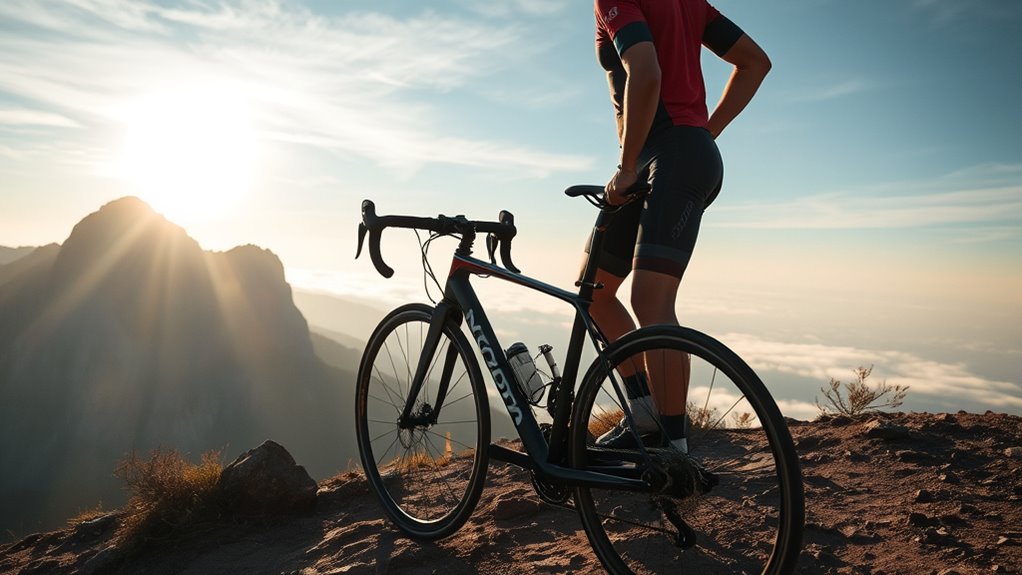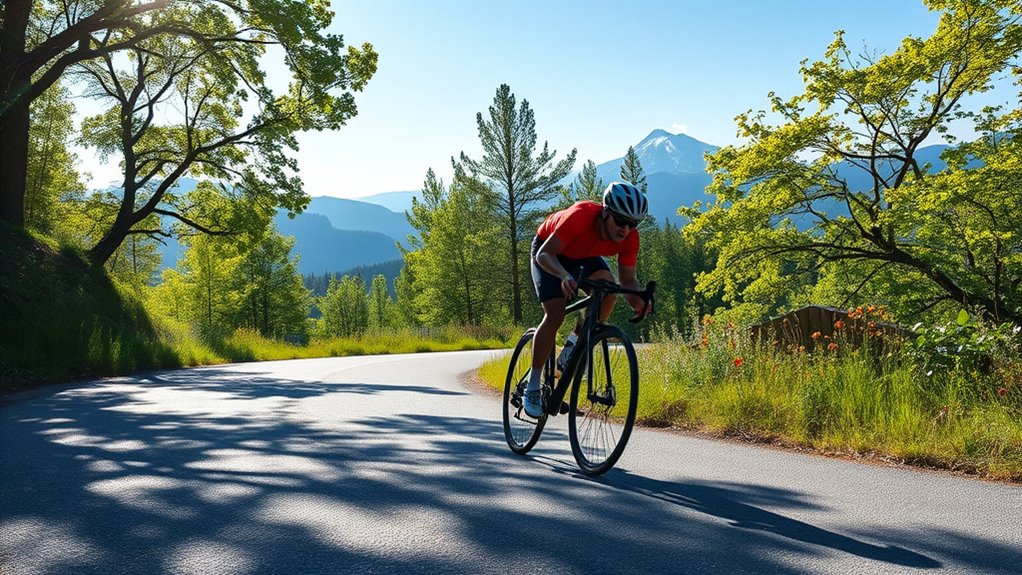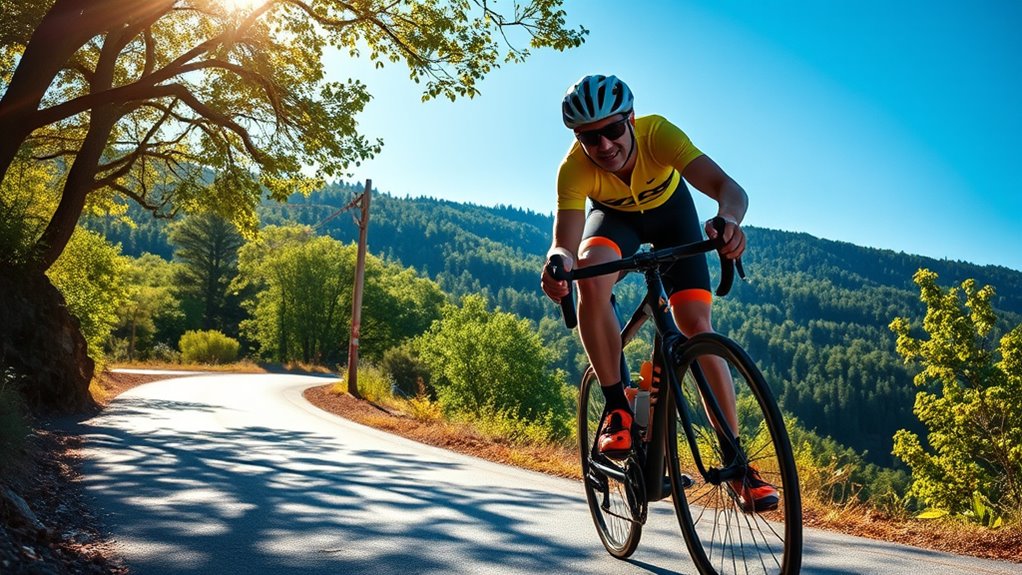Understanding the psychology of cycling helps you stay motivated, set inspiring goals, and overcome obstacles. By identifying what drives you—whether fitness, adventure, or community—you can tailor your approach to keep engagement high. Visualizing success and breaking goals into manageable steps boost confidence and resilience. Embracing setbacks as learning opportunities strengthens mental toughness, while celebrating progress fuels continued passion. Keep exploring these strategies to unleash your full cycling potential and enjoy every ride even more.
Key Takeaways
- Setting clear, achievable goals and breaking them into milestones boosts motivation and provides direction in cycling.
- Visualization techniques strengthen mental resilience, helping cyclists overcome challenges like steep climbs and fatigue.
- Cultivating a growth mindset and embracing setbacks as learning opportunities build emotional toughness.
- Engaging with a supportive cycling community enhances motivation, encouragement, and accountability.
- Celebrating progress and reflecting on achievements reinforce positive habits and sustain long-term commitment.
Understanding the Mental Benefits of Cycling

Cycling offers more than just physical exercise; it also provides significant mental health benefits. As you pedal through different environments, you naturally practice mindfulness, staying present in the moment and reducing stress.
Cycling enhances mental health through mindfulness and stress reduction.
The repetitive motion and focus on the ride help clear your mind, fostering a sense of calm. Regular cycling also boosts emotional resilience, enabling you to better handle life’s challenges. Engaging in outdoor activities like cycling can also stimulate curiosity about new environments, which further enhances mental well-being.
When you encounter setbacks or fatigue, you learn to push through, building mental toughness. This combination of mindfulness practices and resilience strengthens your overall mental well-being. Embracing a consistent cycling routine can also reinforce self-discipline, which is crucial for sustaining mental health benefits over time.
Additionally, developing skills such as properly pairing headphones for different devices can make your cycling experience more enjoyable and comfortable. Cycling becomes a powerful tool not only for physical fitness but also for cultivating a resilient mindset, helping you face daily stresses with greater ease and clarity. Furthermore, the benefits of high-quality equipment can enhance your mental health journey by making cycling more enjoyable and comfortable.
Identifying What Drives You to Ride

What motivates you to get on your bike can vary widely, influencing how often and how passionately you ride. Some ride for the thrill of cycling gear that makes the experience more comfortable and exciting, while others find motivation in exploring new routes. Route planning can be a key factor, helping you discover scenic paths or challenging hills that keep you engaged. Your reasons might include fitness goals, mental clarity, social connection, or simply the joy of being outdoors. Recognizing your personal motivations helps you stay committed, select the right gear, and plan routes that align with your passions. Understanding the importance of heat pump noise levels and other categories can also contribute to a smoother and more enjoyable cycling experience online. Additionally, exploring lesser-known camping spots can inspire outdoor adventures beyond cycling, enriching your overall outdoor experience.
Setting Effective and Inspiring Cycling Goals

Setting goals gives your cycling journey direction and purpose, transforming mere rides into meaningful achievements. To set effective and inspiring goals, consider your interests and abilities. Choose cycling routes that challenge you or bring you joy, whether it’s conquering a mountain trail or exploring scenic countryside. Invest in quality cycling gear that boosts confidence and comfort, making your rides more enjoyable. Break your big goals into smaller, measurable milestones—like increasing distance or improving speed. Keep your goals realistic yet motivating, and track your progress to stay accountable. Additionally, incorporating proper equipment maintenance ensures your gear remains reliable and safe throughout your cycling adventures. Regularly performing gear inspections can prevent unexpected breakdowns and enhance your riding experience. Developing a training plan tailored to your goals can also help you stay focused and progress steadily. Embracing a growth mindset can also help you view setbacks as opportunities to learn and improve, fueling your motivation on challenging days. Recognizing the importance of specific dog breeds or names can also inspire your dedication and commitment to training and goals.
Cultivating Mental Toughness for Long Rides

Building mental toughness is key to pushing through the challenges of long rides. To strengthen your resilience, incorporate mindfulness practices and breathing techniques into your routine. These help you stay present and calm, even when fatigue sets in. Additionally, understanding how automation can optimize your training schedule allows you to plan more effective recovery periods. Imagine:
- Focusing on your breath, inhaling slowly through your nose, exhaling through your mouth to steady your nerves.
- Recognizing negative thoughts and gently redirecting your focus back to the ride.
- Using body awareness to detect tension and release it during breaks.
- Visualizing success, feeling your confidence grow with each mindful breath. Incorporating mindfulness techniques during training can further enhance your mental resilience, helping you stay focused under pressure. Developing a mental toughness mindset can also improve your overall performance and enjoyment of cycling.
Being aware of operating hours of supportive environments like parks or recreational facilities can provide valuable opportunities for recovery and mental refreshment, contributing positively to your training routine.
Using Visualization to Enhance Performance

Visualization is a powerful mental tool that can profoundly boost your cycling performance. By practicing mental imagery, you mentally rehearse successful rides, helping you prepare for challenges and build confidence. When you vividly imagine yourself conquering climbs or finishing races, you reinforce positive outcomes, making them more attainable. Incorporating visualization into your routine before rides or races can help maximize your performance potential. Here’s a quick guide:
| Technique | Focus Area | Benefits |
|---|---|---|
| Mental imagery | Race scenarios | Confidence building |
| Visualization drills | Difficult sections | Reduces anxiety |
| Positive affirmations | Self-belief | Enhances motivation |
| Rehearsing strategies | Race tactics | Improves execution |
| Relaxation exercises | Pre-ride calm | Focus and mental clarity |
Research indicates that visualization techniques can significantly enhance athletic performance by strengthening neural pathways associated with skill execution. This process is supported by psychological insights into how cognitive psychology explains mental rehearsal’s impact on physical performance. Additionally, understanding motivation and setting clear goals can further amplify the effectiveness of visualization practices. Moreover, integrating asset division strategies from family law can help athletes plan for life transitions, ensuring mental clarity beyond sport.
Overcoming Mental Barriers and Self-Doubt

Even with effective visualization practices, mental barriers like self-doubt can still hold you back during rides or races. These barriers create a wall that blocks your confidence and focus.
Mental barriers like self-doubt can still hinder your confidence and focus despite visualization efforts.
To overcome them, picture the following:
- Conquering steep climbs despite feeling unsure.
- Pushing through fatigue when doubts creep in.
- Visualizing success in challenging sprints.
- Replacing negative thoughts with empowering affirmations.
Developing Resilience Through Setbacks

Setbacks are an inevitable part of cycling, but how you respond to them determines your resilience. Mental setbacks, like losing focus or facing injury, test your emotional resilience. Instead of dwelling on failures, view them as opportunities to learn and grow stronger. Reflect on what went wrong, adjust your approach, and keep moving forward. Building resilience involves embracing challenges and staying committed despite difficulties. Use setbacks to strengthen your mental toughness and develop a resilient mindset. Remember, setbacks don’t define you—they refine you. Here’s a quick guide:
| Step | Action | Outcome |
|---|---|---|
| Recognize the setback | Acknowledge your feelings and situation | Emotional clarity |
| Analyze the cause | Identify what went wrong | Insight for improvement |
| Adjust your approach | Modify your strategy | Better preparation |
| Stay committed | Keep cycling towards your goals | Increased resilience |
| Reflect and grow | Learn from the experience | Strengthened mental resilience |
Staying Motivated During Routine or Difficult Periods

When your motivation wanes during tough or routine times, reconnect with your core reasons for cycling.
Break your goals into small, achievable steps and celebrate each victory along the way.
These simple practices can keep your momentum steady and your spirits high.
Revisit Your Why
Revisiting your why can be a powerful way to stay motivated during routine or tough periods in your cycling journey. Reminding yourself of the deeper purpose fuels your passion, especially when progress feels slow.
Picture these moments:
- Visualizing your first long ride after proper bike maintenance.
- Remembering how good you felt after a nutritious meal fueling your ride.
- Recalling the sense of achievement when mastering cycling nutrition strategies.
- Imagining the satisfaction of overcoming a challenging hill.
Set Mini Goals
Creating small, achievable goals can keep your motivation high when your routine feels monotonous or obstacles arise. During training routines, setting mini goals—like increasing your ride duration by five minutes or trying new cycling gear—helps maintain momentum.
These goals should be specific and realistic, giving you a clear sense of progress without feeling formidable. Focus on what you can control, such as improving cadence or mastering a tricky hill.
Celebrating these small achievements keeps your spirits up and reinforces your commitment. When faced with tough days, mini goals serve as stepping stones, making larger objectives less daunting.
They turn routine rides into opportunities for growth, helping you stay engaged and motivated, even during challenging periods.
Celebrate Small Wins
Celebrating small wins keeps your motivation alive, especially during routine rides or tough times. Recognizing these moments boosts your confidence and reinforces positive motivation techniques.
Visualizing your progress helps you see how far you’ve come, making each small achievement meaningful. To celebrate, imagine:
- Crossing a new personal best on your route.
- Completing a challenging hill without stopping.
- Staying consistent with your training schedule.
- Overcoming mental hurdles during tough rides.
Building a Supportive Cycling Mindset

To build a supportive cycling mindset, you need to cultivate positive self-talk and focus on growth rather than setbacks.
Surround yourself with cycling camaraderie, as riding with others boosts motivation and provides encouragement during tough rides.
Emphasizing mental health benefits helps reinforce your commitment, reminding you that cycling isn’t just physical; it’s a way to improve your well-being.
Celebrate progress, no matter how small, to foster resilience and confidence.
When challenges arise, view them as opportunities to learn rather than failures.
Developing this mindset creates a foundation of self-compassion and motivation, making cycling more enjoyable and sustainable.
Celebrating Achievements and Reflecting on Progress

Recognizing and acknowledging your achievements reinforces the positive mindset you’ve worked to develop. Celebrating milestones fuels your motivation and strengthens your cycling rituals.
Celebrating your wins keeps motivation high and reinforces your cycling habits.
After each ride, take time for a post-ride reflection—this helps you appreciate progress and identify areas for growth. Visualize these moments:
- Standing beside your bike, feeling proud of conquering a challenging hill.
- Recording personal bests in your cycling journal.
- Sharing accomplishments with fellow cyclists, boosting camaraderie.
- Planning your next goal with renewed enthusiasm.
Frequently Asked Questions
How Can I Maintain Motivation During Challenging Weather Conditions?
When facing challenging weather conditions, you can boost weather resilience by dressing appropriately and planning your rides around the forecast.
To maintain motivation, remind yourself of your goals and the joy cycling brings, even in tough weather. Focus on the sense of achievement after overcoming these obstacles.
What Mental Strategies Help Prevent Burnout on Long Cycling Journeys?
To prevent burnout on long rides, focus on mental resilience by breaking your journey into manageable segments and celebrating small wins.
Prioritize restful recovery during breaks to recharge mentally and physically.
Use positive self-talk to stay motivated, and visualize your goals to maintain focus.
Staying present helps you enjoy the ride, reducing stress and fatigue.
These strategies keep your mind sharp and resilient, making long cycling journeys more enjoyable and sustainable.
How Does Cycling Impact Mental Health Beyond Physical Fitness?
Cycling offers more than physical benefits; it markedly boosts your mental health. You’ll find that cycling reduces stress relief by releasing endorphins, helping you feel calmer and happier.
Plus, cycling fosters social connection when you ride with friends or join groups, which combats loneliness and enhances your sense of community. These mental health benefits make cycling a powerful activity for improving your overall well-being beyond just fitness.
What Role Does Mindfulness Play in Cycling Performance?
Some might think mindfulness training slows you down, but it actually enhances cycling performance. By focusing on the present moment, you gain mental clarity, allowing you to react quickly and maintain steady control.
Mindfulness helps you stay calm during tough climbs or races, reducing anxiety and increasing focus. Incorporating mindfulness into your routine makes you more aware of your body and surroundings, ultimately boosting your overall cycling experience.
How Can I Balance Competitive Goals With Enjoyment of Riding?
Balancing competition and riding enjoyment means you should set realistic goals that challenge you without taking away the fun. Focus on appreciating the scenery, socializing, and personal progress alongside your competitive pursuits.
Listen to your body and avoid burnout by mixing intense rides with leisurely ones. Remember, maintaining a love for cycling keeps you motivated and helps you enjoy every ride, whether you’re racing or just relaxing on your bike.
Conclusion
Think of your cycling journey as a mountain climb—you’ll face tough patches, but each pedal stroke lifts you higher. By nurturing your motivation, setting clear goals, and embracing setbacks as stepping stones, you build a resilient mind ready for any challenge. Remember, your mental strength is the gear that keeps you moving forward. Keep pedaling with purpose, and watch yourself conquer peaks you once thought impossible. Your best ride is still ahead.









